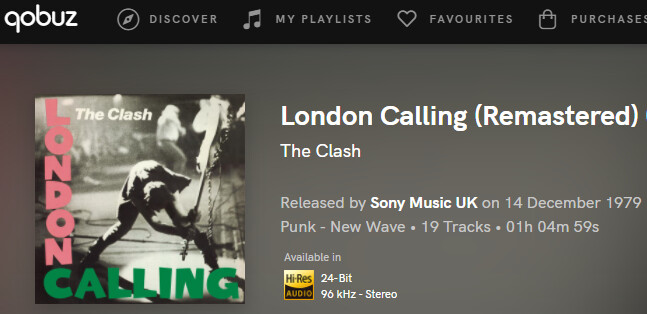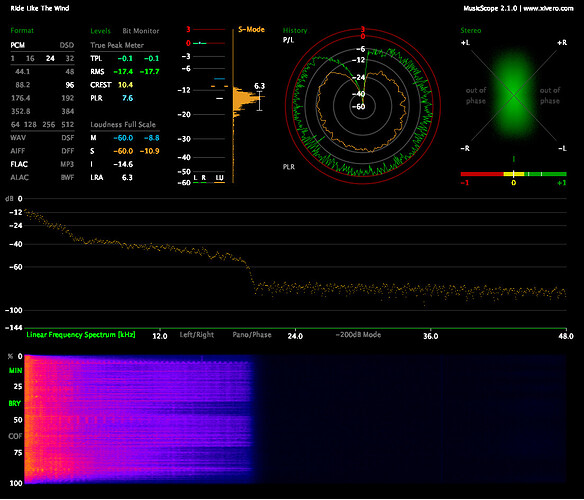Thanks for letting me know. I informed their marketing contact, since they are in touch with Tidal. Bob Stuart is not managing this and MQA allready told Tidal that the content is incorrect. The US agency who did this will be replaced, that’ all I know.

Your’s and Bob Stuart’s pudding perhaps…
But just like the cable wars, the only proof is in an individual’s listening. To me it sounds worse (through a full unfold MQA DAC) and to you it sounds better. There we stand. Sadly, for the most part, the musician’s themselves have no say between the label, Bob Stuart, and the streaming service.
Could You also ask them to reflect the fact that MQA is lossy, DRM, Not approved by the artists, Actually not Hires, More noisy than 16/44 PCM ?
The worst is that MQA (mistreated files)are like McDonald’s Burgers they taste/sound more or less the same. No matter which one You choose
There’s one thing it does mean, for most any other format I require I can trans-code to my heart’s content. I can’t create my own MQA files if the desire was to ever take me, or trans-code other versions from them for that matter. That’s my problem, a closed/propitiatory format of dubious technical merit…
It offers simply the best sound quality compared to PCM and it’s capable to deblur even 16/44.1 digital masters.
So just try it, like it or leave it. MQA is offering me and many others lots of listening pleasure. Sorry if that hurts your feelings,
Studios do not use it as part of production even after a decade, you are not hearing what the artist heard this is an impossible statement to make to the consumer, it’s not lossy in the words of MP3 but it does not preserve frequencies in the hi res domain that were there originally the long term goal is to have one consumer controlled file on all platforms which you have to buy into to ‘better’ the sound, now if audiophiles are happy with that then that’s all well and good, I myself would prefer digital standards that the studios use and alter the file how I want to hear it not what a pre set filter system thinks how I should hear it. The hi res genie was let out of the bottle years ago, certain companies unfortunately want to put it back and make you pay for it going forwards
It is unlikely he will… it doesn’t benefit him or promote what appears to be his purpose here. What happened to the comparison of formats? All we are doing now is replying to what has turned into a marketing thread, a get your foot in the door and market… I don’t believe there was ever any intent to continue the comparison of PCM to MQA once the name dropping got started… I do believe the intention was and has always been to market and promote MQA with a somewhat premeditated path that has been used on other forums and sites.
Let’s keep this about the comparison of the formats, if you want to market MQA create a thread for it called MQA marketing or something… Someone should split the marketing stuff to another thread.
It offers simply the best sound quality compared to PCM and it’s capable of making PCM sound like or better than MQA from the 16/44.1 digital masters.
So just try it, like it or leave it. HQPlayer is offering me and many others lots of listening pleasure. Sorry if that hurts your feelings,
I’m happy and if you are happy as well, then we are both happy with our method or format of choice. 
I would be happy if I could get You to tell me that You do not feel misled (scammed) when a company promises lossless studio quality. And instead delivers upsampled (beyond the actual recording)
Who can forget the 14 bit recordings by Madonna, the ones that was transferred to analogue tape, redigitized. A little MQA magic and suddenly there was a 24/192 recording 
The “magic” is very well described here:
The record label Warner owns the digital master and analogue mix and authenticated the 24/192 MQA version.
How mixing and high definition are defined is described in here
Similar to Christopher Cross’s album named after himself in 24/192/96 and worse resolutions at HDtracks.com. Obviously also as MQA stream in “24/192” on Tidal, as we can see in the screenshot of @Peter_Veen.
I strongly suspect that the MQA version on Tidal is also based on the original highres fake which is still available on HDtracks.com and other sources.
In the past, HDtracks at least gave a hint about upsampling by referring to it in the “small print” like e.g. digitally recorded, mixed and mastered to 24/96 or 24/192. This hint is no longer present. HDtracks is no longer a reliable source for verified highres downloads, Qobuz.com never was by the way due to lack of quality control.
The difference to TIDAL/MQA is that everyone with the appropriate analysis software can identify fakes with HDtracks downloads, but not so easy
with TIDAL streaming.This article seems to just simply show why early digital and CD was inferior. What would be different about just capturing the original analog master into the same UA audio interface at 24/192 and just releasing the 24/192 PCM file? Presumably it was recorded into a DAW or mastering setup as PCM…so how does MQA factor in here?
Apparently the analog master was re-captured at 24/192.
The 2017 MQA release is from a high-quality 192 kHz 24b digital transfer of the original (April 1984) analogue tape using an Ampex ATR104 and a UA2192 A/D converter along with some specific archive techniques.
Agreed. Is there even a DAW that supports MQA? So the artist makes the music in Pro Tools or whatever in PCM. The mix engineer mixes it in PCM. The mastering engineer takes the PCM file and uses it for the careful and detailed mastering process and then delivers a PCM file. But MQA is a more “true” sound to the original? I just can’t wrap my brain around that.
The sound in the studo is the reference, not the master tape, which u fortunately gets blurred during the recording, mixing, editing and mastering proces.
Please take a moment of your time and read this article.
As described by MQA; “the process goes beyond “lossless” and way beyond lossy(MP3, AAC, etc.) technologies to bring the sound
of the master to everyone – in a file format that drops into today’s infrastructure without any need for expensive support.”
"Bring the sound of a master"
Now if a mastering engineer is mastering using 24/96 PCM to do the mastering processing, wouldn’t a bit-perfect 24/96 PCM file literally be “the sound of a master”?
Unless the analog masters are being converted to an MQA compatible mastering system and the mastering engineer is listening to real-time MQA during the process, how could it be a better representation of the original? How is running it through further processing a good thing?

